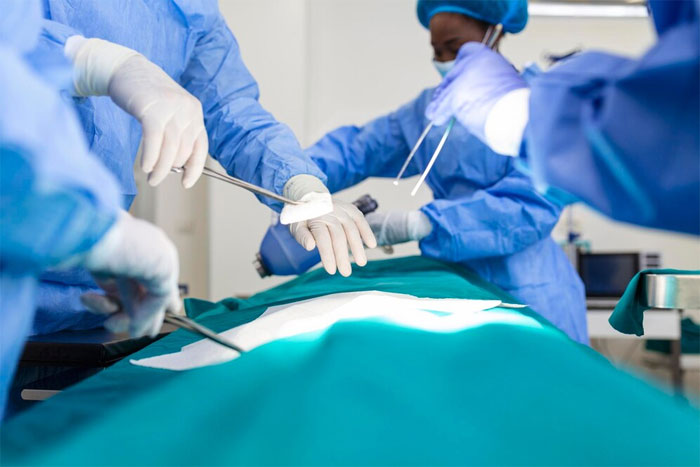What to Expect Before and After Laparoscopic Surgery in Delhi?

Laparoscopy, also known as minimally invasive surgery, has revolutionized the field of surgery, offering patients shorter recovery times, reduced pain, and smaller scars compared to traditional open surgery. Understanding what to expect before and after laparoscopic surgery can help patients prepare mentally and physically for the procedure and ensure a smoother recovery process.
Continue reading to gain complete information about the procedure, helping your decision-making process regarding undergoing laparoscopic surgery in Delhi with Dr. Neeraj Goel, a highly skilled and experienced GI surgeon.
What is Laparoscopic Surgery?
Laparoscopic surgery, also known as minimally invasive surgery, is a modern surgical technique that uses small incisions and specialized tools to perform procedures inside the abdomen or pelvis. A laparoscope, a thin tube with a camera and light source, is inserted through a small incision, allowing surgeons to view internal organs on a monitor. Other small incisions are made for surgical instruments to perform the procedure.
Laparoscopy offers benefits such as reduced pain, shorter recovery times, and minimal scarring compared to traditional open surgery, making it a preferred option for many surgical interventions.
Common Uses of Laparoscopic Surgery
Laparoscopic surgery is employed to address complications associated with various conditions, such as:
- Colorectal cancer
- Crohn's disease
- Diverticulitis
- Rectal prolapse
- Appendicitis
- Gallbladder disease
- Ulcerative colitis
- Bowel incontinence
- Large colon polyps
- Familial polyposis
- Gastric Cancer
- Esophageal cancer
- Pancreaticcancer and other tumours
Preparing for Laparoscopic Surgery
Before undergoing laparoscopy, several steps are typically involved to ensure the procedure's success and the patient's safety:
- Patients are evaluated by their Laparoscopic Surgeon to assess their medical history, current health status, and any underlying conditions that may affect the procedure or anesthesia.
- Patients are given specific instructions on how to prepare for the surgery.
- Anesthesia options, potential risks, and post-operative care are discussed with the patient.
- Depending on the patient's health status and the nature of the surgery, pre-operative tests such as blood tests, imaging studies, and electrocardiograms (ECG) may be conducted.
- Patients are typically instructed to fast from eating or drinking for a specified period before the surgery.
- On the day of the surgery, patients undergo pre-operative preparations, including changing into a hospital gown, receiving intravenous (IV) fluids, and having their vital signs monitored.
On the Day of Laparoscopic surgery Procedure
Laparoscopy, also known as minimally invasive surgery, involves several steps:
- Before the procedure, the patient is administered general anesthesia.
- The surgeon makes a small incision near the belly button (umbilicus) to insert a tube called a trocar.
- Carbon dioxide gas is then pumped into the abdomen to create space for the surgeon to work.
- A laparoscope, a thin tube with a camera and light source, is inserted to view the internal organs on a monitor.
- Additional small incisions may be made to insert surgical instruments.
- The surgeon carefully examines the abdominal organs and performs the necessary surgical interventions.
- Once the procedure is complete, the instruments are removed, and the carbon dioxide gas is released from the abdomen. The small incisions are closed with sutures or surgical tape.
- After laparoscopy, patients are monitored in a recovery area until they wake up from anesthesia.
- Depending on the complexity of the procedure and individual factors, patients may be discharged home the same day or require an overnight hospital stay.
Laparoscopy offers several advantages over traditional open surgery, including smaller incisions, less post-operative pain, shorter hospital stays, and quicker recovery times. However, it may not be suitable for all conditions, and patients should consult with their healthcare provider to determine the most appropriate treatment option.
Recovery and Postoperative Care After Laparoscopic Surgery:
- The immediate postoperative period in the recovery room includes monitoring vital signs and managing pain and discomfort.
- The length of hospitalization depends on the type of surgery and the patient's overall health, but most patients can expect to go home within a day or two.
- Prescription medications, as well as non-pharmacological methods such as ice packs and relaxation techniques, may be used to lessen postoperative pain.
- Keeping the incision sites clean and dry, monitoring for signs of infection, and following the GI surgeon’s instructions for wound care.
- Gradual return to regular activities, including light exercise, driving, and work, as advised by the GI surgeon.
- Schedule follow-up visits with the surgeon to monitor recovery progress, address any concerns, and discuss long-term care plans.
Why visit Dr. Neeraj Goel for Laparoscopic Surgery in Delhi?
Laparoscopic Surgery offers patients a less-invasive alternative to traditional open surgery. By understanding what to expect before and after laparoscopic surgery, patients can approach the procedure with confidence and have a faster recovery process. Open communication with the GI surgeon and adherence to postoperative instructions are essential for achieving successful outcomes and a speedy recovery.
Trust Dr. Neeraj Goel for safe and effective laparoscopic surgery in Delhi tailored to your individual needs. He is renowned as the best GI Surgeon in Delhi and best cancer surgeon in Delhi and excels in laparoscopic surgery, offering advanced techniques and personalized care. With vast experience and expertise, he ensures optimal outcomes and minimal post-operative discomfort.

 info@gastrodelhi.com
info@gastrodelhi.com +91-9599294453
+91-9599294453